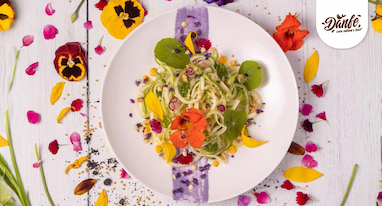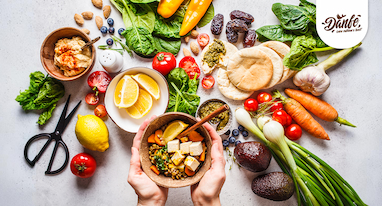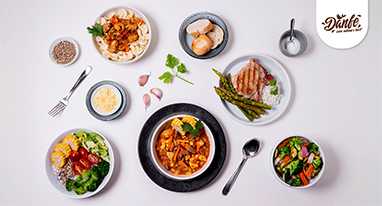World Food Safety Day: Useful Tips for a Healthy and Safe Meal
BY DANFE |

Have you ever read instructions on the packaging of your processed foods like your favorite jams or juices that say ‘Once open, store in a cool dry place’?
Why do you suppose they instruct us to do so? It’s because if not stored properly foods can attract harmful bacteria that may cause you to fall ill.
It is because of this that food safety is important. Now what exactly is food safety? Making sure that food is safe to consume is known as food safety.
This entails taking precautions to avoid contamination of healthy meals and recipes by dangerous bacteria, viruses, parasites, or chemicals.
Importance of Food Safety Day
Every year on June 7th, World Food Safety Day is observed to raise awareness of its significance.
This international initiative aims to promote actions to avoid, detect, and manage foodborne risks as well as increase awareness of the importance of food safety.
We’ll provide you with some helpful advice in this blog in order to consume healthy and hygienic foods.
It might be connected to paying strict attention to packaging, taking part in authenticating, learning about nutritional details, and developing regular safety behaviors.
What Foods To Avoid

If there are any foods that you should definitely avoid they are processed foods. Processed foods include more than just microwave dinners and ready-to-eat meals.
Any food that has been altered in some way during preparation is considered processed and does not count as healthy ingredients in meals and recipes.
Food processing might begin as simply as:
- Freezing
- Canning
- Baking
- Dehydrating
Although not all processed foods are bad, some may contain high levels of salt, sugar, and fat.
These ingredients are added to processed meals to improve their flavor and shelf life, or in some circumstances to contribute to the food’s structure.
People who buy processed foods in hopes of following a healthy diet actually consume more quantities of sugar, salt, and fat because they are unaware of how much has been added to the meal.
So their presumed healthy diet chart is not accountable as they would be consuming unhealthy ingredients and unsafe additives.
Some foods however must be processed to be safe, such as milk, which must be pasteurized to remove hazardous bacteria.
Although most processed foods come with a promise of lasting longer they are adulterated with chemicals that over time pose a health risk.
Preservatives, colors,, and flavorings are just the tip of the iceberg. Many food companies add in thickeners and other agents that just mimic the texture and look of the natural product.
We also must not forget about pesticides and wax that are added to most inorganic and processed foods.
Chemicals like these may result in poor health conditions and in some cases fatality.
Confused about how to choose healthy food? We’ve got your back
What Foods To Include

Natural food and its products, often known as whole foods, are those that nature has supplied for us.
Fresh whole fruits and vegetables, whole grains, seeds, nuts, beans, and legumes are examples. They are the best food for our bodies to thrive and survive.
After all, we are part of nature, and our bodies have evolved to thrive on natural foods. While we can survive on processed foods, it is not suggested that we thrive on them.
Foods that are as close to their natural state as possible, or as nature intended, are high in nutrients that nourish and energize us.
These are also high in nature’s “life force,” which, when combined with necessary vitamins, minerals, and phytonutrients, promotes a natural state of physical and mental health and vitality.
Here’s how natural food products are beneficial:
1. It is a nutrient powerhouse.
Unprocessed plant meals can help you acquire the vitamins and minerals you need for good health.
As an example: 69 g of kiwi has 215 mg of potassium and other vitamins, whereas 100 g of fox nuts has 60 mg of calcium and 14 mg of fiber, among other nutrients.
2. Maintains cardiac health
Natural foods are high in antioxidants and minerals that promote heart health, such as magnesium and healthy fats.
Inflammation, which is a major cause of heart disease, can be reduced by consuming a diet high in whole, unprocessed foods.
This is why natural foods are recommended for all healthy recipes
3. Sugar-free
Processed foods are always high in sugar content, which contributes to obesity, insulin resistance, and type 2 diabetes.
4. Aids in the improvement of gut health
Because of preservatives and other additives, processed meals can be difficult to break down and the stomach. Natural foods may be beneficial to your gut microbiota, or the bacteria that live in your digestive tract. Many of these meals are prebiotics or foods that your gut flora breaks down into short-chain fatty acids. These fatty acids may aid in blood sugar management and intestinal health.
5. Contributes to a more sustainable lifestyle
Including natural foods in your diet can help you produce less non-biodegradable waste and take a step towards becoming more sustainable.
Safety Tips For Healthy Eating

We all are aware of the benefits of eating healthy. However, no one emphasizes eating healthy foods safely.
There are many things that can be done to prevent foodborne illness, including:
- Wash your hands thoroughly with soap and water before, during, and after preparing food.
- Thoroughly cooking all meats, poultry, and seafood.
- Refrigerating food promptly after purchase or preparation.
- Avoiding cross-contamination by keeping raw meat, poultry, and seafood separate from other foods.
- Properly cleaning and sanitizing all surfaces and utensils that come into contact with food.
By following these simple tips, you can help to prevent foodborne illness and enjoy healthy and safe meals.
In addition to the general tips for food safety, there are also some specific tips for preparing healthy and safe vegetarian meals. These tips include:
- Choose a variety of vegetables from all the different food groups.
- Take a course on how to maintain food hygiene
- Cook vegetables in ways that preserve their nutrients.
- Add beans and lentils to your meals for protein and fiber.
- Use whole grains instead of refined grains for more nutrients.
- Limit your intake of processed and outdoor foods and sugary drinks.
By following these tips, you can create healthy and safe vegetarian meals that are both delicious and nutritious.
It’s best to invest in quality ingredients that are easy to store and cook. One such brand from which we can get natural food products that are packed with quality control measures is Danfe Foods.
Danfe food products aren’t sprayed with pesticides and injected with chemicals. Their flours, spices, lentils, and all other ingredients are a perfect fit for you to have a healthy and balanced meal!
Each package delivered by Danfe Foods meets the required food standards.
From delicious and healthy lentils to yummy and sweet laddoos, Danfe Foods will help you make perfectly healthy and tasty dishes every time!
You can also follow our healthy and safe recipe blogs if you’re in the mood to try creating new recipes!
Here’s our latest recipe blog: 8 Best Healthy & Easy Snacks Recipe Ideas
Conclusion
Everyone should be concerned about food safety.
You may contribute to maintaining the safety of your food and avoiding foodborne illnesses by following the straightforward procedures mentioned above.
Numerous symptoms, including nausea, vomiting, diarrhea, and fever, can be brought on by foodborne illness. Foodborne disease can even be lethal in extreme situations.
You may help safeguard yourself and your loved ones from these risks by taking the necessary precautions to ensure food safety.




